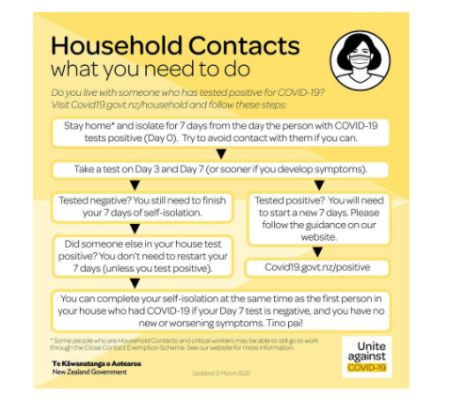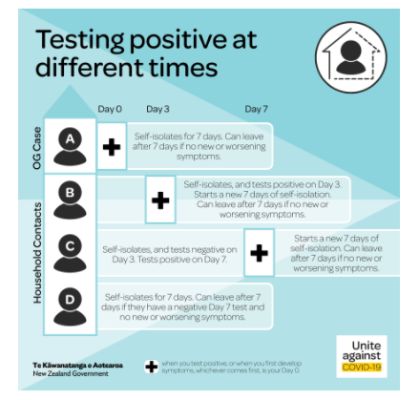Latest COVID-19 Update From The New Zealand Govt | Recent Changes To Be Aware Of: Isolation Period Has Reduced To 7 Days
The isolation period has reduced from 10 days to 7 days for positive cases and Household Contacts.
Household Contacts who are already isolating and test positive will need to begin a new 7 days isolation from that point. Anyone isolating who still has symptoms after 7 days should stay home until 24 hours after symptoms resolve.
With a decline in the infectiousness of Omicron over time, public health advice is that in most cases, transmission occurs within 7 days. Seven days should break the vast majority of potential transmissions, while making sure people can get back to work quicker and therefore reducing the flow on impacts on business operations.

Reminder: upload your RAT results
It is essential people continue to register their positive or negative Rapid Antigen Test (RAT) results on MyCovidRecord. This helps health officials track the spread of COVID-19 across the country.
It's now possible to report a RAT result on behalf of someone else such as family members and for children under 12 via MyCovidRecord.
Anyone who is symptomatic should stay home and get a test. Testing continues to play an important part of the response to COVID-19.
Guide: how to work out when you and your Household Contacts can leave self-isolation.
People who have tested positive do not need to isolate again for 3 months after they have recovered from COVID-19. This is because the risk of reinfection is very low during this time.
Everyone else who is a household contact of someone with COVID-19 and who hasn't previously tested positive, will need to isolate again if they test positive.
You can find more information here for positive cases, Household Contacts and how to self-isolate.
Some Household Contacts who are critical workers may still be able to go to work through the Close Contact Exemption Scheme, provided they meet the criteria here.

Update: Long COVID
There are a number of people who continue to have symptoms of COVID-19 after 12 weeks of their infection, this can be considered long COVID.
Symptoms of long COVID may include; low energy and fatigue, shortness of breath and cough, headaches, low mood, difficulty concentrating (brain fog), ongoing chest paints, racing pulse, aches and pains in muscles, ongoing changes to sense of smell and taste, and poor quality of sleep.
The key thing to do if suffering from these symptoms is to chat to a doctor.
There is ongoing research internationally on the effects of long COVID. Researchers are also looking at ways of treating long COVID. The Ministry of Health will provide further advice based on international evidence and are funding a study by Victoria University of Wellington to assess the long-term effects of COVID on people in New Zealand. 8000 people have been invited to take part in this study.
Resources
Key COVID-19 information in Te Reo Māori and over 35 other languages, plus accessible formats for the disabled community, is available from the Unite Against COVID-19 website.
Information is available in NZ Sign Language, large print & audio, easy read.
Information for Pacific peoples.
Useful posters for your workplace or community.
Financial support for individuals, whānau, foreign nationals, and businesses.
Up-to-date Alert Level information.
Case information and numbers from the Ministry of Health.
Contact information
Call Healthline if you have symptoms 0800 358 5453.
Need to talk? For mental health help, call or text 1737.
Free helpline for businesses, offering advice and access to Government business support, HR and general business advice and access to online resources and webinars.
Call 0800 500 362 for North Island, or 0800 50 50 96 for South Island.
Report issues and people or businesses not following advice to COVID-19 Compliance Centre.
Get the latest information on our website or Facebook.


 NZ Association of Scrabble Players: Watch New Zealand’s 2025 Scrabble Championship Live
NZ Association of Scrabble Players: Watch New Zealand’s 2025 Scrabble Championship Live Waipapa Taumata Rau: Daytime Boosts Immunity, Scientists Find
Waipapa Taumata Rau: Daytime Boosts Immunity, Scientists Find NZ Songwriters Trust: Winners Announced At Country Music Honours
NZ Songwriters Trust: Winners Announced At Country Music Honours NZ Principals Federation: Principals Describe Budget As Bitter Sweet
NZ Principals Federation: Principals Describe Budget As Bitter Sweet GfK Radio: Radio Listening Tops 3.5M Weekly Listeners
GfK Radio: Radio Listening Tops 3.5M Weekly Listeners  Jacob Douglas Motorsport: Douglas Heads To The Oval After Breakthrough Victory
Jacob Douglas Motorsport: Douglas Heads To The Oval After Breakthrough Victory